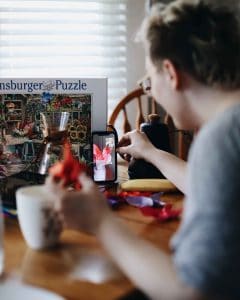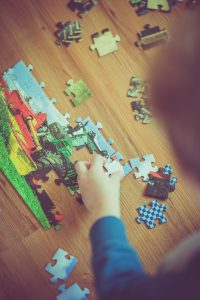Can jigsaw puzzles help reduce stress and anxiety? In today’s fast-paced world, stress and anxiety have become common aspects of everyday life. People are constantly seeking ways to alleviate these feelings and improve their mental health. One surprising solution that has gained popularity is the humble jigsaw puzzle. In this article, we will explore the hypothesis that solving jigsaw puzzles can indeed help reduce stress and anxiety levels.
The Mental Health Benefits of Jigsaw Puzzles
Jigsaw puzzles have long been revered for their ability to improve mental health. Many mental health professionals and researchers have recognized the positive impact puzzles can have on overall well-being. As a longtime jigsaw puzzler myself, I have experienced firsthand the sense of relaxation and satisfaction that comes from completing a challenging puzzle.
A Full Brain Exercise
Solving a jigsaw puzzle requires the use of various cognitive skills, making it a holistic brain exercise. This activity engages multiple neural pathways simultaneously, including those responsible for problem-solving, memory retention, and spatial reasoning. By challenging our brains in this comprehensive manner, jigsaw puzzles help promote and maintain optimal brain health.

Stress Relief and Anxiety Reduction
Working on a puzzle can be a relaxing way to take a break from the demands of day-to-day life. The focused attention required to find and fit each puzzle piece helps divert our minds from stressors and anxieties. It creates a state of concentration and flow, allowing our brains to temporarily escape the worries and pressures of everyday life.
The Shared Challenge
Puzzling can also be a social activity, providing an opportunity to connect with others. Solving jigsaw puzzles with friends or family members presents a shared challenge, fostering a sense of camaraderie and teamwork. This shared experience can help reduce feelings of isolation and provide a supportive environment to tackle stress and anxiety together.
Blood Pressure and Heart Health
Stress and anxiety can have negative effects on our physical well-being, specifically on our cardiovascular system. However, research suggests that actively engaging in relaxing activities, such as working on jigsaw puzzles, can help lower blood pressure and reduce the risk of heart disease. This stress-relieving effect on the body further highlights the potential health benefits of puzzles.

Problem-Solving Skills and Cognitive Function
One of the fundamental skills required to solve a jigsaw puzzle is problem-solving. As we meticulously analyze each puzzle piece, we develop our ability to identify patterns and make connections. These problem-solving skills can also be transferred to real-life situations, improving our ability to overcome challenges and reducing stress levels associated with problem-solving.

Memory Enhancement
Jigsaw puzzles not only benefit problem-solving skills but also help enhance memory. As we repeatedly engage with the pieces, searching for the right fit, we exercise our memory recall functions. This consistent mental stimulation can have a long-term positive impact on memory retention and potentially mitigate memory loss related to aging or other factors.
Final Thoughts – Can Jigsaw Puzzles Help Reduce Stress and Anxiety?
In summary, jigsaw puzzles have been proven to be effective stress relievers and anxiety reducers. Jigsaw puzzles ability to engage various cognitive functions, offer a full brain exercise, and promote social interaction provides numerous mental health benefits. As a relaxing and fulfilling hobby, jigsaw puzzles can be an effective tool in one’s toolkit to cope with stress and anxiety in today’s fast-paced world. So, the next time you feel overwhelmed, consider taking a break and spending some time with a jigsaw puzzle on a dedicated wooden table. Your brain and mental well-being will thank you for it.
